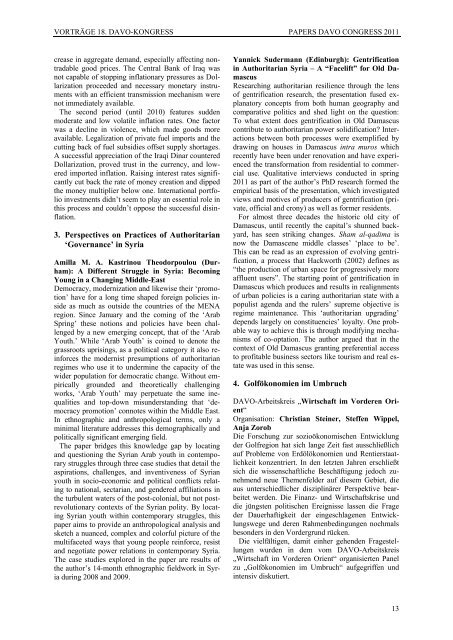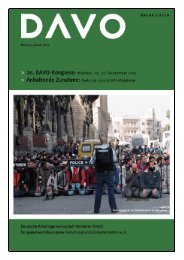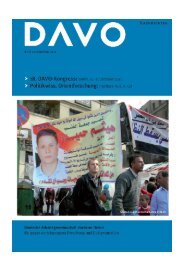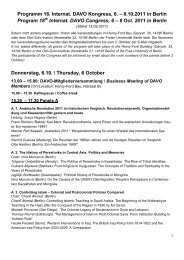4 Dissertationen und Habilita- tionen / Dissertations and Habilitations
4 Dissertationen und Habilita- tionen / Dissertations and Habilitations
4 Dissertationen und Habilita- tionen / Dissertations and Habilitations
Erfolgreiche ePaper selbst erstellen
Machen Sie aus Ihren PDF Publikationen ein blätterbares Flipbook mit unserer einzigartigen Google optimierten e-Paper Software.
VORTRÄGE 18. DAVO-KONGRESS PAPERS DAVO CONGRESS 2011<br />
crease in aggregate dem<strong>and</strong>, especially affecting nontradable<br />
good prices. The Central Bank of Iraq was<br />
not capable of stopping inflationary pressures as Dollarization<br />
proceeded <strong>and</strong> necessary monetary instruments<br />
with an efficient transmission mechanism were<br />
not immediately available.<br />
The second period (until 2010) features sudden<br />
moderate <strong>and</strong> low volatile inflation rates. One factor<br />
was a decline in violence, which made goods more<br />
available. Legalization of private fuel imports <strong>and</strong> the<br />
cutting back of fuel subsidies offset supply shortages.<br />
A successful appreciation of the Iraqi Dinar countered<br />
Dollarization, proved trust in the currency, <strong>and</strong> lowered<br />
imported inflation. Raising interest rates significantly<br />
cut back the rate of money creation <strong>and</strong> dipped<br />
the money multiplier below one. International portfolio<br />
investments didn’t seem to play an essential role in<br />
this process <strong>and</strong> couldn’t oppose the successful disinflation.<br />
3. Perspectives on Practices of Authoritarian<br />
‘Governance’ in Syria<br />
Amilla M. A. Kastrinou Theodorpoulou (Durham):<br />
A Different Struggle in Syria: Becoming<br />
Young in a Changing Middle-East<br />
Democracy, modernization <strong>and</strong> likewise their ‘promotion’<br />
have for a long time shaped foreign policies inside<br />
as much as outside the countries of the MENA<br />
region. Since January <strong>and</strong> the coming of the ‘Arab<br />
Spring’ these notions <strong>and</strong> policies have been challenged<br />
by a new emerging concept, that of the ‘Arab<br />
Youth.’ While ‘Arab Youth’ is coined to denote the<br />
grassroots uprisings, as a political category it also reinforces<br />
the modernist presumptions of authoritarian<br />
regimes who use it to <strong>und</strong>ermine the capacity of the<br />
wider population for democratic change. Without empirically<br />
gro<strong>und</strong>ed <strong>and</strong> theoretically challenging<br />
works, ‘Arab Youth’ may perpetuate the same inequalities<br />
<strong>and</strong> top-down mis<strong>und</strong>erst<strong>and</strong>ing that ‘democracy<br />
promotion’ connotes within the Middle East.<br />
In ethnographic <strong>and</strong> anthropological terms, only a<br />
minimal literature addresses this demographically <strong>and</strong><br />
politically significant emerging field.<br />
The paper bridges this knowledge gap by locating<br />
<strong>and</strong> questioning the Syrian Arab youth in contemporary<br />
struggles through three case studies that detail the<br />
aspirations, challenges, <strong>and</strong> inventiveness of Syrian<br />
youth in socio-economic <strong>and</strong> political conflicts relating<br />
to national, sectarian, <strong>and</strong> gendered affiliations in<br />
the turbulent waters of the post-colonial, but not postrevolutionary<br />
contexts of the Syrian polity. By locating<br />
Syrian youth within contemporary struggles, this<br />
paper aims to provide an anthropological analysis <strong>and</strong><br />
sketch a nuanced, complex <strong>and</strong> colorful picture of the<br />
multifaceted ways that young people reinforce, resist<br />
<strong>and</strong> negotiate power relations in contemporary Syria.<br />
The case studies explored in the paper are results of<br />
the author’s 14-month ethnographic fieldwork in Syria<br />
during 2008 <strong>and</strong> 2009.<br />
Yannick Sudermann (Edinburgh): Gentrification<br />
in Authoritarian Syria – A “Facelift” for Old Damascus<br />
Researching authoritarian resilience through the lens<br />
of gentrification research, the presentation fused explanatory<br />
concepts from both human geography <strong>and</strong><br />
comparative politics <strong>and</strong> shed light on the question:<br />
To what extent does gentrification in Old Damascus<br />
contribute to authoritarian power solidification? Interactions<br />
between both processes were exemplified by<br />
drawing on houses in Damascus intra muros which<br />
recently have been <strong>und</strong>er renovation <strong>and</strong> have experienced<br />
the transformation from residential to commercial<br />
use. Qualitative interviews conducted in spring<br />
2011 as part of the author’s PhD research formed the<br />
empirical basis of the presentation, which investigated<br />
views <strong>and</strong> motives of producers of gentrification (private,<br />
official <strong>and</strong> crony) as well as former residents.<br />
For almost three decades the historic old city of<br />
Damascus, until recently the capital’s shunned backyard,<br />
has seen striking changes. Sham al-qadima is<br />
now the Damascene middle classes’ ‘place to be’.<br />
This can be read as an expression of evolving gentrification,<br />
a process that Hackworth (2002) defines as<br />
“the production of urban space for progressively more<br />
affluent users”. The starting point of gentrification in<br />
Damascus which produces <strong>and</strong> results in realignments<br />
of urban policies is a caring authoritarian state with a<br />
populist agenda <strong>and</strong> the rulers’ supreme objective is<br />
regime maintenance. This ‘authoritarian upgrading’<br />
depends largely on constituencies’ loyalty. One probable<br />
way to achieve this is through modifying mechanisms<br />
of co-optation. The author argued that in the<br />
context of Old Damascus granting preferential access<br />
to profitable business sectors like tourism <strong>and</strong> real estate<br />
was used in this sense.<br />
4. Golfökonomien im Umbruch<br />
DAVO-Arbeitskreis „Wirtschaft im Vorderen Orient“<br />
Organisation: Christian Steiner, Steffen Wippel,<br />
Anja Zorob<br />
Die Forschung zur sozioökonomischen Entwicklung<br />
der Golfregion hat sich lange Zeit fast ausschließlich<br />
auf Probleme von Erdölökonomien <strong>und</strong> Rentierstaatlichkeit<br />
konzentriert. In den letzten Jahren erschließt<br />
sich die wissenschaftliche Beschäftigung jedoch zunehmend<br />
neue Themenfelder auf diesem Gebiet, die<br />
aus unterschiedlicher disziplinärer Perspektive bearbeitet<br />
werden. Die Finanz- <strong>und</strong> Wirtschaftskrise <strong>und</strong><br />
die jüngsten politischen Ereignisse lassen die Frage<br />
der Dauerhaftigkeit der eingeschlagenen Entwicklungswege<br />
<strong>und</strong> deren Rahmenbedingungen nochmals<br />
besonders in den Vordergr<strong>und</strong> rücken.<br />
Die vielfältigen, damit einher gehenden Fragestellungen<br />
wurden in dem vom DAVO-Arbeitskreis<br />
„Wirtschaft im Vorderen Orient“ organisierten Panel<br />
zu „Golfökonomien im Umbruch“ aufgegriffen <strong>und</strong><br />
intensiv diskutiert.<br />
13





